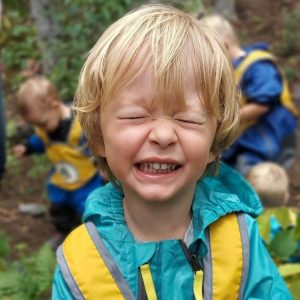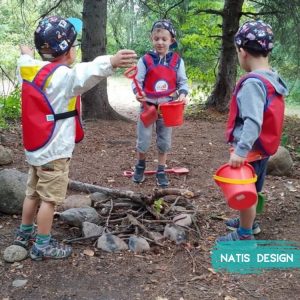By Nathalie Lizé
Early Childhood Educator
Being part of nature educational philosophy, Reggio Emilia has recently become more and more Popular in Quebec, in Canada and elsewhere in the world. Appearing in Italy, in the city of the same name, in the 60s, this innovative approach was thought of and created by a teacher named Loris Malaguzzi. Inspired by the Knowledge and development theories from Piaget, Bruner and Montessori among others. The relevance of this philosophy is undeniable. Malaguzzi recognizes children an infinite wealth of potential and knowledge and puts them in control of their own development. According to him, kids are able to be involved in their learning at all levels and do not develop passively.
With Reggio Emilia, adults and children are in constant interrelation and evolve in collaboration. The adult supports the child’s discoveries. He provides him with all he needs to develop adequately. He is in constant research for new Knowledge. Educators, parents and the surrounding community work hand in hand for children, so they can explore the world and grow up the best way possible. Reggio Emilia pedagogy uses democratic interventions and humanistic thinking and applies it to preschool environments to create fun, discoveries and learning.
If you do not know the great theorists who inspired this philosophy of education, here are some interesting links to consult.
https://en.m.wikipedia.org/wiki/Jean_Piaget
https://en.m.wikipedia.org/wiki/Jerome_Bruner
https://en.m.wikipedia.org/wiki/Maria_Montessori
All the place for growing
The learning process is what matters, the results are not important. Since children are the primary agents of their development and are lifelong learners, they are allowed to explore through trial/error and discover the world from their point of view and interests. As children learn through playing, learning is made out of fun and remains a playful expérience. As adults allow great autonomy to their group, self-esteem, self confidence and personal abilities are strengthened. The little ones grow up in freedom and pleasure. They have the full right to participate, to give their opinion and are accepted for what they are, as unique and authentic beings. They make the most of their creativity, curiosity and explore different forms of intelligence across the 100 languages.

The role of different adults
Teachers or educators are learning partners. They observe, listen, discuss and provide provocations for children to explore as much as possible. They invent a calming and creative environment. Materials and objects are arranged and left for free manipulation by the kids. The observations are detailed and quantified with cards and notes throughout the workshops. This will help understanding the characteristics of each member of the group. Educators enrich children’s knowledge by researching and documenting learning. Teacher’s must renew Knowledge to always go further, without ever neglecting the interests and questionimg coming from the little ones they take care of. The documentation makes it possible to adapt the environment as much as possible, in order to always meet the needs of the
children. Also, in the Reggio approach, adults see children as equals, intelligent, fully capable and competent people. They talk to them to get to know them better. They give feedback on activities and moments of exploration in order to learn about the experiences and feelings of the little ones. Children make sensory discoveries, with objects and materials coming from nature. Another significant feature is the important place left to parents. They are essential partners in the Reggio pedagogy since they are the first educators of their children. They are seen as allies and they are involved in the whole process.
Finally, the resources of the community are used and exploited to complete this environment of discovery and well-being. For example, the municipality would allow children to use the spaces of community gardens to produce a vegetable patch.
The hundred languages
Loris Malaguzzi considers that there are 100 languages that the child uses to express himself. According to him, these languages are all interrelated and equally important. They must be stimulated and encouraged. What are these hundred languages? What is Malaguzzi talking about? He uses this image of a hundred languages to represent all forms of human expression that helps to grow up: linguistic, bodily, musical, scientific, etc …
He wrote the following poem to help us understand his vision.
https://reggioemilia2015.weebly.com/uploads/6/0/4/1/60415081/5116684.jpg?424
The environment
In Reggiane pedagogy the environment is essential and is considered as the 3rd teacher, the interior environment but also the exterior one. Ideally, an arrangement that makes it possible to go outside easily and to be able to observe nature and its changes is to be favored. Otherwise, provide reminders to nature, for example, sensory boxes containing flowers, branches, pine cones, etc …
To set up a living environment that meets the criteria of Reggio Emilia, it is essential to bet on organized and uncluttered spaces. Let the light in as Much as possible and use transparency. Add
mirrors and accessible, transparent storage bins that allow kids to know easely what they contain. Make sure you can rearrange and move objects and furniture, in order to vary the play areas, according to the interests and discoveries of the group.
As contact with the outside is an integral part of this pedagogy, The furniture is made of natural materials such as wood and the decoration is inspired by the colors of nature. Walls or other vertical spaces are used as a showroom for different projects. Thus, families and other people gravitating in the educational environment can admire the achievements produced.
If you are curious to know more about the interesting nature pedagogy, of which Reggio is a part, you can consult my text on the subject, with the following link:
https://natis.ca/en/early-childhood-growing-through-nature/
To give you creative ideas for activities related to Reggio Emilia, do not hesitate to visit Pinterest.
Talk to you soon
Nathalie Lizé



